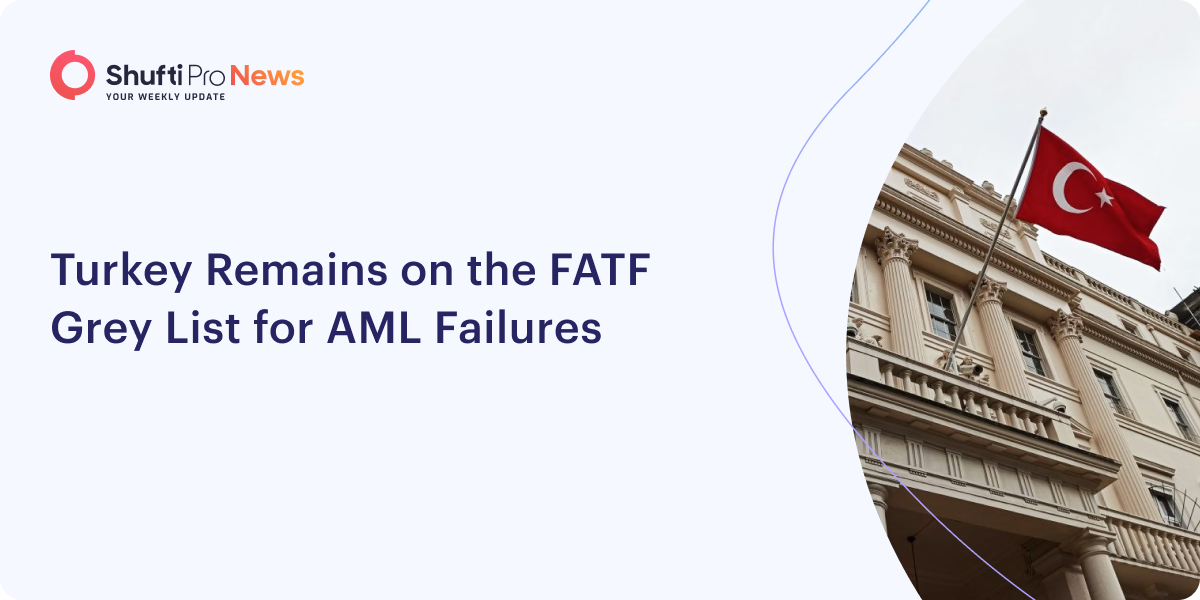Turkey Remains on the FATF Gray List for AML Regulations Failures

Turkey’s government has failed to comply with Anti-Money Laundering (AML) and Counter-Financing Terrorism (CFT) regulations despite implementing effective mechanisms to combat financial crimes and remain grey-listed by Financial Action Task Force (FATF).
In July 2023, FATF published a report that Turkey needs to comply with the recommendations to combat financial crimes. The report urged the Turkish government to undertake a rigorous investigation of the money laundering and terrorism financing cases. To accomplish FATF’s demands, Turkey needs to enhance their AML and CFT frameworks whilst working under the surveillance of regulatory watchdog to curb terrorist financing and other illicit activities.
The liberal political environment given by President Recep Tayyip Erdogan’s Government is the primary reason behind the various illicit activities that damaged the Turkish financial system, such as money launderers, drug traffickers, terrorist organisations, and criminal syndicates. These issues were identified by the regulatory watchdog in October 2021, which placed Turkey on the FATF’s “Grey List” and urged an increased monitoring system.
Being on the grey list makes it complicated for the Turkish government to attract international companies for investment, and borrowing loans is also expensive because Turkey is already facing financial challenges. To overcome these emerging issues on the country’s financial and economic standing, it has submitted an action plan to FATF since then. Turkey’s measures have yet to be satisfactory and require them to focus on the steps highlighted by the regulatory watchdog. However, compliance with the FATF’s obligations remains crucial for Turkey to achieve the trust of the global business community.
Although FATF welcomes the positive points of Turkey’s AML compliance plan to regain the trust of international bodies, it still concluded that Turkey must implement innovative and strict ways to comply with FATF recommendations. One of the main issues with Turkey is the funding of the non-registered NGOs involved in terrorist financing, mainly in conflict areas such as Syria and Iraq. Numerous organisations, including some Turkish affiliates of foreign NGOs, have been able to give jihadist groups illicit cash over the past ten years, enabling them to continue terrorism operations. Such initiatives have largely gone unnoticed by the Erdogan administration, and in some cases, the Turkish intelligence agency MIT was directly involved in sponsoring them.
In addition to this, the Turkish government also misused the AML/CFT laws and used the criminal justice system to target political components. These activities weakened the AML regulations and eroded trust in the country’s judicial system. Erdogan’s government decisions had hurt civil society, bottlenecked the freedom of speech, and damaged democratic principles.
Implementing rigid measures according to FATF is essential for Turkey to recover from financial crises. It is crucial to design AML/CFT regulations that ensure the integrity of the country’s financial system. Turkey’s government should not turn a blind eye to illegal activities and stop using judicial systems to take revenge on the legitimate opposition and government critics.
Suggested Reads:
THE US SECURITIES AND EXCHANGE COMMISSION IDENTIFIES AML FAILURES OF US BROKERAGE FIRMS











